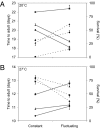Influence of climate on malaria transmission depends on daily temperature variation
- PMID: 20696913
- PMCID: PMC2930540
- DOI: 10.1073/pnas.1006422107
Influence of climate on malaria transmission depends on daily temperature variation
Abstract
Malaria transmission is strongly influenced by environmental temperature, but the biological drivers remain poorly quantified. Most studies analyzing malaria-temperature relations, including those investigating malaria risk and the possible impacts of climate change, are based solely on mean temperatures and extrapolate from functions determined under unrealistic laboratory conditions. Here, we present empirical evidence to show that, in addition to mean temperatures, daily fluctuations in temperature affect parasite infection, the rate of parasite development, and the essential elements of mosquito biology that combine to determine malaria transmission intensity. In general, we find that, compared with rates at equivalent constant mean temperatures, temperature fluctuation around low mean temperatures acts to speed up rate processes, whereas fluctuation around high mean temperatures acts to slow processes down. At the extremes (conditions representative of the fringes of malaria transmission, where range expansions or contractions will occur), fluctuation makes transmission possible at lower mean temperatures than currently predicted and can potentially block transmission at higher mean temperatures. If we are to optimize control efforts and develop appropriate adaptation or mitigation strategies for future climates, we need to incorporate into predictive models the effects of daily temperature variation and how that variation is altered by climate change.
Conflict of interest statement
The authors declare no conflict of interest.
Figures




References
-
- Dietz K. The estimation of the basic reproduction number for infectious diseases. Stat Methods Med Res. 1993;2:23–41. - PubMed
-
- Craig MH, Snow RW, Le Sueur D. A climate-based distribution model of malaria transmission in sub-Saharan Africa. Parasitol Today. 1999;15:105–111. - PubMed
-
- Rogers DJ, Randolph SE. In: Global Mapping of Infectious Diseases: Methods, Examples and Emerging Applications (Advances in Parasitology) Hay SI, Graham A, Rogers DJ, editors. San Diego: Elsevier; 2006. pp. 345–381. - PubMed
-
- Harvell CD, et al. Climate warming and disease risks for terrestrial and marine biota. Science. 2002;296:2158–2162. - PubMed
Publication types
MeSH terms
LinkOut - more resources
Full Text Sources
Other Literature Sources
Medical

